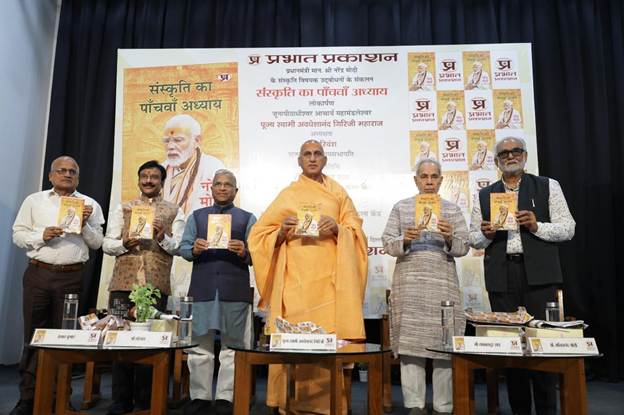Ministry of Culture
Since 2014, India has begun discussing its culture with pride – Shri Harivansh
India’s cultural environment has transformed since 2014 – Mahamandaleshwar Swami Avdheshanand Giri
प्रविष्टि तिथि:
18 APR 2025 9:45PM by PIB Delhi
On the occasion of World Heritage Day (18 April), a compilation of Prime Minister Narendra Modi’s speeches and thoughts on culture, titled 'Sanskriti ka Panchva Adhyay', was released at the Indira Gandhi National Centre for the Arts (IGNCA). The book was released by Acharya Mahamandaleshwar Pujya Swami Avdheshanand Giri Ji Maharaj, the head of the Juna Akhara. The event was chaired by Deputy Chairman of the Rajya Sabha, Shri Harivansh, with IGNCA Chairman Shri Ram Bahadur Rai present as the Guest of Honour. IGNCA Member Secretary Dr. Sachchidanand Joshi also graced the occasion.

The book 'Sanskriti ka Panchva Adhyay' compiles Prime Minister Narendra Modi’s addresses on Indian culture, traditions, spiritual values, and cultural heritage delivered on various occasions. The foreword has been penned by Shri Ram Bahadur Rai, and the compilation has been curated by Dr. Prabhat Ojha. Published by Prabhat Prakashan, the book represents Prime Minister Modi’s vision of cultural resurgence as a central objective of his government.
On the occasion, Swami Avdheshanand Giri Ji Maharaj remarked that since 2014, innovation has been witnessed in every direction across the country and that a transformation in the atmosphere is evident. He lauded Prime Minister Modi’s cultural contributions, saying, “Since Narendra Modi became Prime Minister in 2014, a definite change has occurred. People now discuss cultural subjects with greater depth and pride.” Citing an example, he said, “In 2008, an Indian guru residing in Europe made great efforts to establish an International Yoga Day and sought help from the Indian government. In 2016, Narendra Modi made it a reality. Today, 21st June is celebrated worldwide as International Yoga Day-a proof to his commitment to India’s cultural heritage.”
Shri Harivansh referred to Ramdhari Singh Dinkar’s seminal work 'Sanskriti ke Chaar Adhyay', whose foreword was written by Jawaharlal Nehru. He said that had Dinkar been alive today, he would have revisited and revised parts of his work to enrich it further. Shri Harivansh added that after 1952, discussions around culture faded, but since 2014, they have re-emerged. “Post-2014, India has begun to speak about its culture and ancient heritage with pride, and this credit goes to the Prime Minister.” He concluded his speech by quoting a famous lines from Shri Raghubeer Narayan’s 'Batojhiya' song: "Sundar su bhoomi bhaiya Bharat ke deshwa mein, mor praan base him khoh re Batojhiya.”
Shri Ram Bahadur Rai highlighted two dimensions of Narendra Modi’s persona – that of a statesman and an administrator, and that of a spiritually inclined leader. Light-heartedly addressing the Prime Minister’s critics, he said, “Narendra Modi’s personality evokes chemical reactions in people -those with a positive outlook see his virtues, while the negative-minded remain entangled in criticism.” He added that various narratives are woven around Modi, but this book presents a distinct portrayal- that of a saint-hearted Prime Minister. “Among the vast repository of books written on the Prime Minister, this one stands out. It contains that brilliant Kohinoor which a saint offers to King Vikramaditya in the 'Vetal Pachisi' . That Kohinoor is India’s culture.”
Delivering the welcome address, Dr. Sachchidanand Joshi highlighted the significance of the Prime Minister’s motto "Virasat bhi, Vikas bhi” (Heritage as well as Development). He noted the special importance of launching this book on World Heritage Day, stating that it presents the vision of a new India. Dr. Prabhat Ojha, the compiler of the book, introduced it, stating that it features 34 of the Prime Minister’s speeches, along with an appendix containing the reflections of two spiritual leaders, both of whom appear to endorse the Prime Minister’s cultural perspective. The programme was anchored by Shri Prabhat Kumar of Prabhat Prakashan, who also delivered the vote of thanks.
About the Book
Towards the end of his detailed foreword, Shri Ram Bahadur Rai writes: “If we are searching for the keyboard to the supercomputer of Indian culture, that quest begins and ends with this book. In this sense, this chapter is inspired by culture in the Modi era. It is also an invitation to a cultural journey.” This thought clearly articulates the objective behind publishing Prime Minister Modi’s cultural addresses in the form of a book.
This journey includes various milestones that the reader can interpret through these speeches. The speeches are arranged chronologically, beginning with the 2015 Independence Day address and concluding with one delivered on 20 October 2024 at the inauguration of the R.J. Shankar Eye Hospital in Varanasi. The first speech, from the ramparts of the Red Fort, discusses national issues, welfare schemes, and government achievements. The final one, naturally, touches on public health, but also includes the Prime Minister’s tribute to three Shankaracharyas of the Kanchi Kamakoti tradition.
Together, these 34 speeches cover a wide range of cultural contexts - from sacred shrines like Kedarnath, Shri Ram Janmabhoomi, Kashi Vishwanath Mandapam, and Omkareshwar, to occasions such as the launch of various editions of the 'Bhagavad Gita', Guru Nanak Jayanti, the Global Buddhist Conference, the birth anniversary of Acharya Vijay Vallabh Surishwar Ji Maharaj, and the World Sufi Conference.
An excerpt from the Prime Minister’s address at the World Sufi Conference reads: 'Rooted in the sacred Quran and Hadith, Sufism became the face of Islam in India. It flourished in India's openness and pluralism, and by connecting with its ancient spiritual traditions, it evolved a uniquely Indian identity. Sufism helped shape a distinctive Islamic legacy in India."
These speeches reflect a quest to identify the Indianness in various religious traditions. The appendix contains reflections by Acharya Shri Pragya Sagar Ji Maharaj and Shankaracharya Shri Shankar Vijayendra Saraswati Swami Ji of Kanchi Kamakoti. Both appear to affirm the cultural vision espoused by the Prime Minister.
****
Sunil Kumar Tiwari
pibculture[at]gmail[dot]com
(रिलीज़ आईडी: 2122825)
आगंतुक पटल : 939